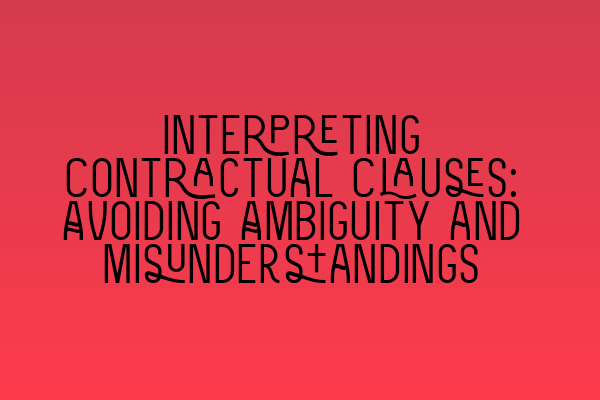Interpreting Contractual Clauses: Avoiding Ambiguity and Misunderstandings
Contracts are the backbone of any business transaction or legal agreement. They lay out the rights, obligations, and expectations of all parties involved. However, even the most carefully drafted contracts can sometimes fall prey to ambiguity and misunderstandings. This can lead to disputes, legal battles, and significant financial losses. That’s why it’s crucial to have a solid understanding of how to interpret contractual clauses to avoid such pitfalls. In this article, we will explore key strategies and principles to ensure clarity and effectiveness when interpreting contractual clauses.
1. Clear and Precise Language
The foundation of any well-drafted contract lies in its language. It is vital to use clear, concise, and unambiguous language when drafting contractual clauses. Ambiguous terms can lead to multiple interpretations, creating confusion and potential disputes. Ensure that each clause is written in a manner that leaves no room for doubt or misinterpretation.
2. Contextual Understanding
To properly interpret a contractual clause, it’s essential to consider its context within the entire agreement. Analyze the clause in relation to the other clauses, the purpose of the contract, and the intentions of the parties involved. By understanding the broader context, you can avoid misunderstandings and arrive at the intended interpretation.
3. Interpretation in Favor of Clarity
When faced with an ambiguous clause, courts often interpret it in favor of clarity. This means that if there are multiple reasonable interpretations, the one that is most clear and easily understood will be preferred. It is in the best interest of all parties to ensure that their contracts are easily comprehensible to avoid unnecessary disputes.
4. Ordinary Meaning
In most cases, contractual clauses should be interpreted according to their ordinary or plain meaning. This means that words should be given their usual and customary interpretation in the relevant industry or context. However, if there are specific definitions or industry standards mentioned within the contract, those should be followed instead.
5. Purpose and Intent of the Parties
When interpreting a contractual clause, consider the purpose and intent of the parties involved. What were their motivations, goals, and expectations at the time the contract was formed? By understanding the underlying purpose of the contract, you can interpret the clause in a manner that aligns with the parties’ intentions.
6. Trade Usage and Custom
If the contract relates to a specific industry or trade, it is essential to consider the trade usage and custom prevalent in that field. Trade usages and customs can help clarify ambiguous terms and give greater insight into the intended meaning of certain contractual clauses. Ignoring trade usages and customs can lead to misunderstandings and misinterpretations.
7. Prior Course of Dealing
If the parties involved have had previous dealings or have established a course of conduct, those prior arrangements can impact the interpretation of contractual clauses. Past agreements, practices, and behaviors can shed light on the parties’ intentions and help resolve ambiguities. It is vital to consider the entire history of the business relationship when interpreting contractual clauses.
Conclusion
Interpreting contractual clauses accurately is a fundamental skill for any lawyer or solicitor involved in contract law. By employing clear and precise language, considering the context, favoring clarity, adhering to ordinary meanings, understanding purpose and intent, considering trade usage, and taking into account prior dealings, one can avoid ambiguity and misunderstandings. These strategies not only reduce the risk of disputes but also create stronger and more effective contracts that reflect the parties’ true intentions.
Remember, a carefully drafted and accurately interpreted contract forms the basis of any successful business relationship. Waste no time in enhancing your contract law skills to become a proficient solicitor and expert in interpreting contractual clauses.
Related Articles:
1. SQE 1 Practice Exam Questions
2. SQE 1 Practice Mocks FLK1 FLK2
3. SQE 2 Preparation Courses
4. SQE 1 Preparation Courses
5. SRA SQE Exam Dates
